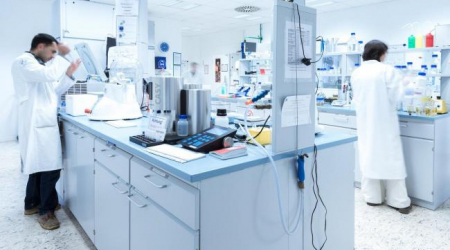The Biology Laboratory infrastructure and team:
The Biology Laboratory (BioLab) is a modern research infrastructure unit, supported by an experienced team with diversified domains of expertise: Stefanie Bröhl (e.g. histology, microscopy, fish larvae identification, cultures of zoo- and phytoplankton, respirometry), Sonja Peters (molecular work and microbiology), Constanze von Waldthausen (e.g. biomarkers, enzymatic measurements, fatty acid extraction), Silvia Hardenberg (Lab head).

From left to right: Stefanie Bröhl, Sonja Peters, Constanze von Waldthausen, Silvia Hardenberg
The range of applications available is broad and tailored to the need of ZMT researchers who work in very diverse research fields, including characterization of food products derived from coastal ecosystems (e.g. carbohydrates, proteins, fatty acids quantification), evaluation of stress responses of organisms to changes in environmental conditions (e.g. biomarkers, enzymatic activities, gene expression analysis, histology, respirometry), ecology and evolution of organisms living in coastal ecosystems (e.g. molecular or microbial applications, including biodiversity assessment via molecular determination (metabarcoding and/or metagenomics) of microbial, plant and animal communities from environmental samples). The BioLab also supports the implementation and maintenance of zoo- or phytoplankton cultures.
The BioLab facilities notably comprise:
- A S1/L2 lab (with restricted access), designated for activities classified under S1/L2 regulations, thus allowing activities involving genetic engineering (according to safety level 1) and the culture and processing of microorganisms up to risk group 2. Activities are supervised by Sonja Peters, the Project Leader GenTSV and person in charge of the Biological Agents Ordinance regarding microorganisms (L2 laboratory, TRBA), and conducted following strict protocols and workflows under proper documentation. The lab is notably equipped with a clean bench, incubators and a deep freezer.
- A clean lab (with restricted access), entirely separated from other laboratories, specifically dedicated to environmental DNA (eDNA) and ancient DNA (aDNA) molecular work. This area is fully equipped to allow for DNA extraction from environmental samples (sediment or water) and for library preparation.
- Separated Pre- and post-PCR areas (distinct rooms), ensuring molecular work according to best scientific practice, and avoidance of cross-contaminations. The equipment available allows for efficient molecular work at the DNA or RNA level, photometric and fluorometric quantification of nucleic acids, standard and real-time PCR cyclers (e.g. for gene expression study or highly sensitive species identification from environmental samples).
- A formalin lab, equipped with suction systems that provide a safe environment when working with samples fixed in formalin (or other fixatives). A Zooscan® allows for the fast identification of zooplankton, enabling plankton analyses at high throughput.
- A microscopy room, equipped with different optical instruments (e.g. stereo and fluorescence microscopes) to support a wide range of taxonomic and histological work on tropical organisms (fish larvae, macrobenthos).
- An extraction room, specifically dedicated to fatty acid extraction, thus minimizing sample contamination.
- A culturing area equipped with a clean bench to ensure pure microalgal culture maintenance.
- A climate constant room allows for experiments under controlled conditions.
The BioLab also maintains, and provides training for, field work equipment, including several optical sensor systems to measure photosynthesis (PAM), light (LICOR), near-infra-red spectrum (NIRS, portable field instrument), or microsensors to measures various biogeochemical parameters at the microscale.
Training and quality insurance:
All activities are supervised by the BioLab team, ensuring proper in-depth training of all lab users to good laboratory practices according to German safety regulations. The high quality of measurements is ensured by following internationally accepted Standard Operation Procedures (SOP). When needed, the team of the Biology Laboratory develops new SOP for the specific needs of ZMT researchers, based on in-depth and statistically sound comparisons of published (or publicly available) protocols. The inclusion of internal standards or negative/positive controls while measuring samples, and the proper protocolling of all steps in laboratory notebooks by all users, is another measure for monitoring the quality of the data produced.
Additional activities:
The BioLab also contributes to the education of Biology laboratory technician apprentices, in collaboration with the University of Bremen.
In addition to general lab support, the BioLab also provides guidance to scientists for the announcement and proper management of biological samples (Meldung nach Artikel 23 der Verordnung (EG) Nr. 1069/2009 - Tierische Nebenprodukte am ZMT"), via Sonja Peters - contact person within ZMT for the "Lebensmittelüberwachungs-, Tierschutz- und Veterinärdienst des Landes Bremen (LMTVet Bremen)" office.





